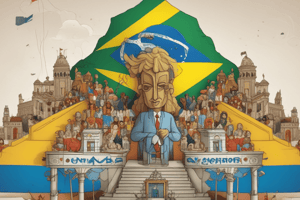Podcast
Questions and Answers
O surgimento do autoritarismo no Brasil teve consequências de longo alcance para as instituições ______ e o tecido social.
O surgimento do autoritarismo no Brasil teve consequências de longo alcance para as instituições ______ e o tecido social.
democráticas
A administração de Bolsonaro foi caracterizada por polarização, ataques à ______, desrespeito às normas internacionais e enfraquecimento das instituições públicas.
A administração de Bolsonaro foi caracterizada por polarização, ataques à ______, desrespeito às normas internacionais e enfraquecimento das instituições públicas.
mídia
A erosão das normas democráticas também criou espaço para movimentos ______ ganharem força, exacerbando ainda mais as tensões na sociedade.
A erosão das normas democráticas também criou espaço para movimentos ______ ganharem força, exacerbando ainda mais as tensões na sociedade.
extremistas
A história política do Brasil pode ser rastreada até a implementação de sua constituição em ______, que estabeleceu o quadro para o governo representativo.
A história política do Brasil pode ser rastreada até a implementação de sua constituição em ______, que estabeleceu o quadro para o governo representativo.
Um exemplo dessa história turbulenta é o golpe de ______ de 1964, que derrubou um governo civil eleito e iniciou uma ditadura militar de 21 anos.
Um exemplo dessa história turbulenta é o golpe de ______ de 1964, que derrubou um governo civil eleito e iniciou uma ditadura militar de 21 anos.
O surgimento do autoritarismo no Brasil foi evidenciado pela eleição de Jair Bolsonaro, cuja vitória veio em meio a uma crescente insatisfação com o desempenho do governo e uma perda percebida de confiança nas ______ políticas tradicionais
O surgimento do autoritarismo no Brasil foi evidenciado pela eleição de Jair Bolsonaro, cuja vitória veio em meio a uma crescente insatisfação com o desempenho do governo e uma perda percebida de confiança nas ______ políticas tradicionais
Estudos sugerem que a inclinação dos eleitores brasileiros para o autoritarismo desempenhou um papel crucial na ascensão de Bolsonaro ao ______
Estudos sugerem que a inclinação dos eleitores brasileiros para o autoritarismo desempenhou um papel crucial na ascensão de Bolsonaro ao ______
As atitudes autoritárias são influenciadas por vários fatores, incluindo a angústia ______, a corrupção política e a crise de legitimidade das ______ políticas
As atitudes autoritárias são influenciadas por vários fatores, incluindo a angústia ______, a corrupção política e a crise de legitimidade das ______ políticas
O cenário político do Brasil tem visto o surgimento do autoritarismo, com a vitória de Jair Bolsonaro na eleição presidencial de 2018 marcando um ponto de ______ na história do país
O cenário político do Brasil tem visto o surgimento do autoritarismo, com a vitória de Jair Bolsonaro na eleição presidencial de 2018 marcando um ponto de ______ na história do país
Para entender as implicações dessa mudança, é essencial explorar os fatores que contribuem para o autoritarismo no Brasil, seu impacto e a ampla ______ política do país.
Para entender as implicações dessa mudança, é essencial explorar os fatores que contribuem para o autoritarismo no Brasil, seu impacto e a ampla ______ política do país.
Flashcards are hidden until you start studying
Study Notes
Introduction
The political landscape of Brazil has seen the rise of authoritarianism, with Jair Bolsonaro's victory in the 2018 presidential election marking a turning point in the country's history. This period saw the decline of democratic norms and the erosion of institutions, raising concerns about the future of Brazil's democratic culture. To understand the implications of this shift, it is essential to explore the factors contributing to authoritarianism in Brazil, its impact, and the broader political history of the country.
Authoritarianism in Brazil
In recent years, Brazil has witnessed a surge in authoritarian tendencies, as evidenced by the election of Jair Bolsonaro. His victory came amidst growing dissatisfaction with the government's performance and a perceived loss of trust in traditional political institutions. Some argue that Bolsonaro's success can be attributed to the prevalence of authoritarian sentiment amongst the Brazilian populace, with many voters embracing hierarchies of power and expressing little concern for democratic values.
Studies suggest that Brazilian voters' inclination toward authoritarianism played a crucial role in Bolsonaro's rise to power. These authoritarian attitudes are influenced by various factors, including socioeconomic distress, political corruption, and the legitimacy crisis of political institutions. This disillusionment with the established order created an environment where a far-right authoritarian candidate like Bolsonaro could gain significant electoral support.
It is important to note that the presence of authoritarian tendencies within Brazil's electorate is not a recent phenomenon. Evidence indicates that authoritarianism has been an enduring feature of Brazilian society, with nonwhites, conservatives, the less educated, and women tending to score higher on measures of authoritarianism. These trends suggest that the country's political culture may be more conducive to authoritarian rule than previously assumed.
Impact of Authoritarian Rule
The rise of authoritarianism in Brazil has had far-reaching consequences for the country's democratic institutions and social fabric. Bolsonaro's administration was characterized by polarization, attacks on the media, disregard for international norms, and weakened public institutions. This environment made it difficult for civil society organizations to operate effectively, undermining their role as crucial pillars of democracy.
Moreover, authoritarianism has led to social unrest and increased inequality, particularly affecting marginalized groups such as Indigenous peoples and Afro-descendants. The erosion of democratic norms has also created space for extremist movements to gain traction, further exacerbating tensions within society.
Despite these challenges, there have been positive developments in Brazil's democracy. For instance, former President Luiz Inácio Lula da Silva's successful election in 2022 marked a significant milestone in the country's democratic progress. His victory demonstrated that despite Bolsonaro's attempts to alter the electoral landscape, Brazilians still value democratic principles and the importance of free and fair elections.
Political History of Brazil
To understand the current state of affairs in Brazil, it is essential to examine the country's historical context. Brazil's democratic history can be traced back to the implementation of its constitution in 1988, which established the framework for representative government. However, this period saw numerous challenges to democratic governance, including military coups and episodes of authoritarian rule.
One example of this turbulent history is the 1964 coup, which ousted an elected civilian government and ushered in a 21-year military dictatorship. During this time, human rights abuses were rampant, and political freedoms were severely restricted. It took several decades for Brazil to return to substantially democratic forms of government.
While some improvements have been made since then, Brazilian politics remains fraught with instability and corruption. This background sets the stage for the emergence of figures like Jair Bolsonaro who capitalize on popular discontent and exploit divisions within society to pursue authoritarian agendas.
Brazilian Democracy and Political Culture
Brazil's experience with authoritarianism highlights the need to address underlying issues related to political culture and democratic values. Despite the challenges faced by Brazilian democracy, there are signs that the country's civil society is resilient and capable of pushing back against authoritarian tendencies.
For instance, during the Bolsonaro administration, civic groups played a crucial role in defending democratic institutions and promoting liberal and social rights. Their efforts helped ensure that Brazilian democracy survived his presidency and laid the groundwork for the eventual return of democratic leadership.
Moving forward, it will be essential for Brazilian society to continue nurturing its vibrant civil society while working to strengthen democratic norms and institutions. By doing so, Brazil can build a stronger foundation for sustainable democracy and counter the threat posed by authoritarian forces.
Studying That Suits You
Use AI to generate personalized quizzes and flashcards to suit your learning preferences.





